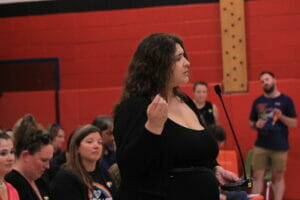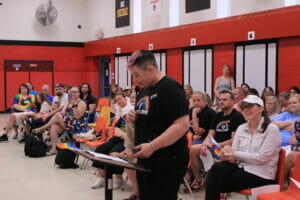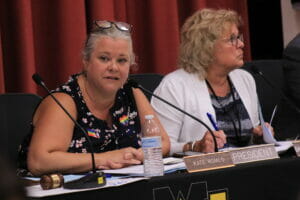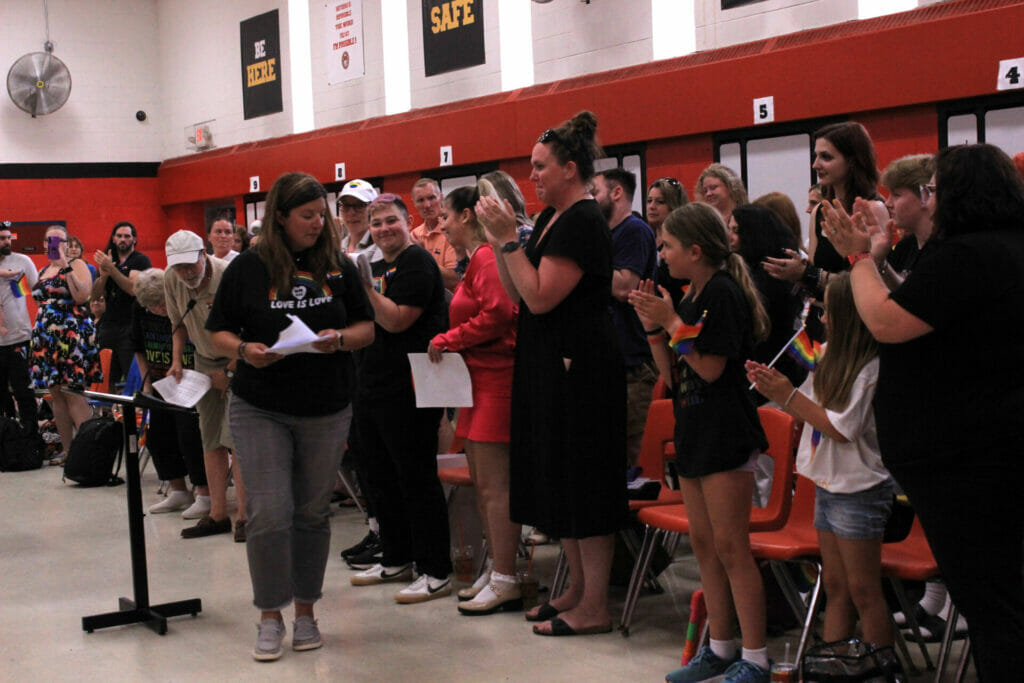More than 50 people turned out to support and speak up for the West Milford, NJ, high school Gender and Sexuality Alliance (GSA) during a Board of Education meeting Tuesday night. Students, educators, families, and alumni showed up to express how the club helps all students find community and safety.
A student founding member of the 2010 class, Raven Romero, told the Board and room full of parents and community members that GSA saved her life.

“At the end of the day, [GSA] is suicide prevention,” Romero said. “Personally, for me, I would not be here today, alive, to speak on this if it wasn’t for the GSA. That was a community that showed me love.”
Like most people in the room, Romero showed up after learning a board member had threatened to vote down the GSA adviser’s stipend at a meeting last month. The board member had inaccurately conflated the club’s mission to provide a safe space for all identities to sex education and inaccurately referred to a time when a substitute adviser, also a coach and teacher in the district, lost his teaching license after inappropriate contact with students from a different extracurricular club.
Tina Signorelli, who has taught and advised the school’s GSA for nearly two decades, was the first to speak at Tuesday’s public comment.
“Our mission is simply to provide a safe space for students. We spend meetings learning about local, national, and global LGBTQ+ issues,” said Signorelli. “We champion the students’ success and comfort them during their struggles.”
The seasoned adviser and educator explained why West Milford, like many schools, needs GSA.
“This is not just my opinion, research backs this,” Signorelli said. “Students in schools with GSAs are less likely to hear homophobic remarks in school than students in schools without one. LGBTQ+ students who attend schools with GSAs are less likely to report feeling unsafe. LGBTQ+ students are less likely to miss school when there is a GSA. LGBTQ+ students in schools with GSAs are significantly more likely to be aware of a supportive adult at school, which is reported to improve grade point averages and impact post-secondary education as compared to LGBTQ+ students who do not.

The National Institutes of Health reported that students active in GSA “were more likely to feel greater acceptance from peers and have increased hope and ability to encourage social justice. In addition, students who were more engaged in GSAs were less likely to show signs of depression or anxiety.”
Signorelli shared letters she’s received from students over the years, expressing what the GSA has meant to them:
- “In this town, having a friendly ally around school is super important, and you have helped more gay kids than you realize.”
- “Coming out in high school is one of the most terrifying things I’ve ever done. Feeling the support from a teacher was life-saving… I remember not feeling judged or threatened by the fact that you knew I was gay.”
- “You may never know all the ways that you have saved lives.”
“None of these quotes or anecdotes are about me or who I am as a person, this is the role of a GSA adviser,” she said.
Former students spoke up Tuesday night, informing the Board how the GSA helped them and helped the entire school.
“My junior year I found GSA. I walked into Ms. Signorelli’s classroom on the first day of school and was greeted by an environment I hadn’t exactly experienced before,” said Sarah Chandler, a 2021 graduate.

Chandler recalled signs around the room designating the space as “hate-free,” while one sticker depicted the equality sign and another read “I’m a safe person to come out to.”
“I vividly remember coming home from [the] first GSA meeting I attended, I was smiling. I hadn’t often found myself smiling for presumably no reason like that, but I felt hope,” Chandler said. “GSA gave me hope.”
School boards and library boards were recently reminded that New Jersey has laws mandating inclusive education and stands against discrimination targeting vulnerable students.
Attorney General Matthew Platkin and Acting Commissioner Dr. Angelica Allen-McMillan released a joint statement in June addressing “the rising tide of bias and hate” in New Jersey schools.
“In New Jersey, the law is clear. The LAD [Law Against Discrimination] prohibits schools from adopting policies or practices that discriminate against students or staff based on their race, gender, sexual orientation, gender identity, gender expression, or other protected characteristics, whether or not motivated by discriminatory intent. The LAD also prohibits policies or practices that create a hostile environment based on any protected characteristic,” the statement reads.
Attorney General Platkin also recently filed civil rights complaints against school districts passing policies requiring schools to out students, noting such actions are not only harmful they also break the law.
“Because the policy requires school staff to “out” LGBTQ+ youth to their parents, it exposes them to severe harms to their safety and mental health,” Platkin noted, adding such policies are “counter to guidance from the New Jersey Department of Education concerning the confidentiality and privacy of such information.”
On Tuesday, West Milford’s Board of Education extended the public comment period twice to accommodate more speakers. Board members then expressed gratitude to those who showed up to speak out.

“I look at this audience, I’m seeing many staff members who are here in support. And I think that’s a good thing because it shows that the work that you’re doing with GSA and in the school itself,” Board member Lynda Van Dyk said. “These are the fruits of your labor right here.”
Board member William Cytowics, who had spoken against the GSA in the June board hearing and spread misinformation about its mission, said their words changed his mind about the GSA at West Milford.
“You’ve won over my heart,” he said.
Board President Kate Romeo also said a few words. “I feel the love,” said Romeo. “I do want to—Mr. Cytowics—just say you’re a good team player. Even when you make comments that upset the community, you’re still willing to learn and listen, and I respect that from you.”
Signorelli said she approached Cytowics after the meeting.
“I shook his hand and thanked him for listening,” Signorelli recalled.













